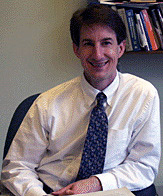Kevin M. Carlsmith, a highly regarded ÌÇÐÄvlog¹ÙÍø professor and researcher who battled cancer for the past three years, died Nov. 19 in his boyhood home in California surrounded by members of his family. He was 44.
Carlsmith, an associate professor of psychology, arrived at ÌÇÐÄvlog¹ÙÍø in 2003, having earned a PhD at Princeton University (2001), a masters from Princeton (1998), a masters from the University New Hampshire (1996), and a bachelors of science from Lewis & Clark College (1989).
His research examined theories of morality and justice in a social psychological context. He was particularly interested in the question of punishment, and of how people perceive the purpose of punishing wrongdoers (i.e., for deterrence or for moral retribution).
Carlsmith published his findings in numerous prestigious journals, and was regularly invited to comment by the media, including the New York Times, Los Angeles Times, and Canadian Broadcasting Corp., about contemporary issues of punishment, such as analyzing the motivations and justification for the killing of Osama bin Laden.

The recipient of three grants from the National Science Foundation, he also was a regular reviewer of scholarly articles for journals in psychology and law.
Carlsmith grew up in Portola Valley, Calif., as the son of two academic psychologists, J. Merrill Carlsmith and Lyn K. Carlsmith. He would study psychology at college, where he also pursued his passion for the outdoors, which he had come to love as a boy on backpacking trips to Yosemite and the Sierra Nevada mountains.
He was deeply involved with the outdoor program at Lewis & Clark and led frequent trips into the wilderness of the Pacific Northwest. After college he worked at the North Face and served as a river guide and rock-climbing instructor for Outward Bound. He taught for four years at the White Mountain School in New Hampshire, tutoring students with learning disabilities, supervising a dormitory, and offering instruction in a variety of outdoor activities.
Carlsmith returned to academia full-time in 1996 when he undertook his master’s at the University of New Hampshire.
Upon arriving at ÌÇÐÄvlog¹ÙÍø, he taught a variety of classes, including Introduction to Social Psychology, Research Design and Statistics, Propaganda and Persuasion, and a first-year seminar of his own design titled Just Punishment. He also served as chair of the Institutional Review Board and as faculty adviser to the Psychology Club.
His students and colleagues at ÌÇÐÄvlog¹ÙÍø speak in glowing terms of the contributions he made to the department and to the school. He inspired students to pursue challenging theses and ambitious research projects; he championed both efficiency and collegiality in department decision-making; he provided humanity and practical suggestions in administrative capacities; and he was a valuable resource for colleagues in thinking through the research design and statistical reliability of their own research and analysis.
In 2010-11 Carlsmith was as a fellow of the Center for Advanced Study in the Behavioral Sciences at Stanford University. His cancer prevented him from utilizing the resources there to his full advantage, and his health declined significantly during his year there.
Carlsmith is survived by his wife, Alison Mathias, a Virginia native he had met at a swing-dance class at Princeton; two daughters, Abigail and Julia; a brother, Chris Carlsmith, and his family of Arlington, Mass.; and a sister, Kim Sampson, and her family of Orlando, Fla.
In lieu of flowers, it is asked that photos, written anecdotes, and other memories be sent to his wife at 31 Berenda Way, Portola Valley, CA 94025, in order to help Abby and Julia remember their father in years to come.
A special was held on campus Sept. 2 at which colleagues and
friends were able to share remembrances. For more information on his
struggle with cancer, please visit this .